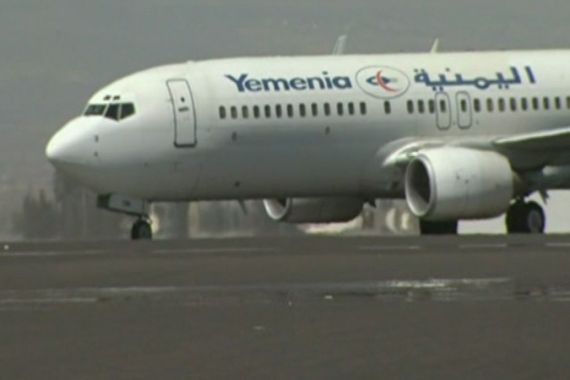First commercial flight out of Sanaa in six years postponed
Rival sides trade blame after the Amman-Jordan flight planned as part of the UN-brokered truce was indefinitely postponed.

The first commercial flight out of Yemen’s rebel-held capital in six years was indefinitely postponed on Sunday in a blow to an already fragile truce in the country’s grinding conflict, as rival sides traded blame for the flight postponement.
The Sanaa-Amman flight had been planned as part of the United Nations-brokered truce agreement that the internationally-recognised government and the Houthi rebels struck earlier this month.
Keep reading
list of 4 itemsYemen inaugurates new presidential council
UN: Yemen’s Houthi rebels agree to stop using child soldiers
US Navy says new task force to patrol Red Sea amid Yemen war
The 60-day truce, which went into effect on April 2, came amid concerted international and regional efforts to find a settlement to the conflict that devastated the Arab world’s poorest country and pushed it to the brink of famine.
The Saudi-led military coalition launched a war in early 2015 in support of the internationally-recognised President Abd-Rabbu Mansour Hadi, who was forced into exile months after the Iranian-backed Houthis seized Sanaa and much of northern Yemen.
In recent years, the conflict has become a regional proxy war that has left more than 150,000 people dead, including at least 14,500 civilians. It has also created one of the worst humanitarian crises in the world.
Blame game
As part of the truce, the two sides agreed to operate two commercial flights a week to and from Sanaa to Jordan and Egypt. Sanaa is blockaded by the Saudi-led coalition preventing supplies of essential goods, including life-saving medicines.
However, both sides failed to agree on operating the flight more than three weeks after the truce took effect. They have traded blame for the failure.
Calling it a “violation” of the truce, authorities in Sanaa said the flight was postponed after being denied the necessary permits from the Saudi-led coalition.
In Houthi-controlled Sanaa, the deputy head of civil aviation, Raed Talib Jabal, said the coalition’s refusal to permit Sunday’s flight was “a violation of the truce” that began earlier this month.
“The coalition of aggression deliberately seeks to double the suffering of the Yemeni people, while seeking to mislead international public opinion about the humanitarian file,” he said.
Yemen’s government blamed the Iran-backed Houthi rebels for the postponement, claiming they had tried to “smuggle” members of the Revolutionary Guards and Lebanese armed group Hezbollah onto the flight.
Moammar al-Eryani, information minister of the internationally-recognised government, said the Houthis did not adhere to the agreement by providing passengers with passports issued by the rebels, which it has not recognised since March 2017.
He said the government allowed the travel of 104 passengers on the Sanaa-Amman flight, but the Houthis insisted on adding 60 more passengers “with unreliable passports” using “fake names and forged documents”.
The flight “faltered due to the Houthi terrorist militia’s non-compliance with the agreement stipulating the approval of passports issued by the legitimate government”, al-Eryani said.
A spokesman for the Houthis did not respond to a request for comment.
‘Deep disappointment’
UN special envoy to Yemen Hans Grundberg voiced concern over the delay and urged the parties to work with his office “to find a solution that allows the flights to resume as planned”.
A renewable two-month truce that went into effect in early April “is meant to benefit civilians including through reducing violence, making fuel available, and improving their freedom of movement to, from and within their country”, he said on Sunday.
Norwegian Refugee Council (NRC) also expressed “deep disappointment” at the flight cancellation.
“This would have been a first small but important step towards long-lasting stability in Yemen. It is also a life-saver for tens of thousands of medical patients who desperately need urgent treatment abroad,” NRC Yemen Country Director Erin Hutchinson said in a statement.
“We hope both parties stick to their truce commitments, including allowing flights out of Sana’a airport and opening roads to Taiz and other governorates.”
UN Envoy Grundberg: "I'm concerned by the postponement of the 1st commercial flight from Sanaa airport which was scheduled for today. I urge the parties to work constructively with me and my Office to find a solution that allows the flights to resume as planned.
— @OSE_Yemen (@OSE_Yemen) April 24, 2022
The plane, operated by national carrier Yemenia, was expected to take off from the government-controlled southern port city of Aden, stop off in Sanaa, and take passengers in need of medical treatment to Jordan’s capital Amman.
But hours before the flight, the airline said “it has not yet received operating permits”. It expressed “deep regret to the travellers for not being allowed to operate” the long-awaited flight.
Yemenia added that it hoped “all problems will be overcome in the near future”, without specifying a date.
Sick passengers stranded
The flight postponement was a setback for a truce deal that has provided a rare respite from violence in much of the country, and has also seen fuel tankers begin arriving at the port of Hodeidah, potentially easing fuel shortages in Sanaa and elsewhere.
In another potentially hopeful sign, Yemen’s President Hadi on April 7 handed his powers to a new leadership council tasked with holding peace talks with the Houthis.
The airport in Sanaa has been closed to commercial traffic since August 2016 when air attacks disrupted service to the city.
Aid flights continue to land in Sanaa, although service has periodically halted.
The pause of commercial flights has prevented “thousands of sick Yemeni civilians from seeking urgent medical treatment outside the country”, humanitarian groups CARE and NRC said last August.
They also cited “economic losses estimated to be in the billions”.
Daily flights out of Aden as well as the eastern city of Seiyun fly both domestically and to other countries in the region.